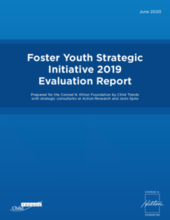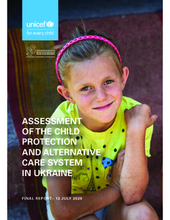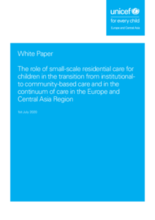Displaying 271 - 280 of 991
This paper details the protocol for Navigating Through Life, a study that utilises novel research methods to better understand the pathways and outcomes of young people as they leave out-of-home care (OOHC) in Western Australia (WA).
In this webinar, hosted by Better Care Network and SOS Children's Villages International, panelists - including careleavers who served as co-trainers in the Leaving Care project - discussed the training, building a supportive network for care leavers, and the support needed to ensure that the rights of young people in alternative care are respected and that they are prepared for an independent life.
This report summarizes some of the major accomplishments, challenges, and lessons learned from the Foster Youth Strategic Initiative, which aimed to ensure that older youth in foster care in Los Angeles County (LA) and New York City (NYC) become self-sufficient and thriving adults.
This ISS study of the child protection system as it particularly relates to alternative care was commissioned by UNICEF Ukraine. This report contains an overview of the child protection and alternative care system in Ukraine based on the process of a desk review and a 10 day fact finding mission in Ukraine in February 2020 undertaken by a team of experts from International Social Service (ISS).
The current study employed Interpretative Phenomenological Analysis (IPA) to guide the analysis of semi-structured interviews with eight young people with a range of care experiences, looking at the topic of confiding in others.
The current study employed Interpretative Phenomenological Analysis (IPA) to guide the analysis of semi-structured interviews with eight young people with a range of care experiences, looking at the topic of confiding in others.
This article describes the psychosocial resilience processes that facilitate successful transitioning of young women as they journey out of residential care towards young adulthood.
This White Paper summarizes evidence on the current use and impact of small-scale residential care (also: ‘SSRC’) and offers guidance on how to enable all children to grow up in a loving and stable family environment. It aims to promote better decisionmaking among policy-makers, local governments, non-governmental organizations (NGOs), as well as child welfare and other, allied practitioners of the establishment.
This article reports the findings of MIRRA, a participatory research project on the memory and identity dimensions of social care recordkeeping.
This study presents findings from a systematic review of interventions that target successful reunification.



